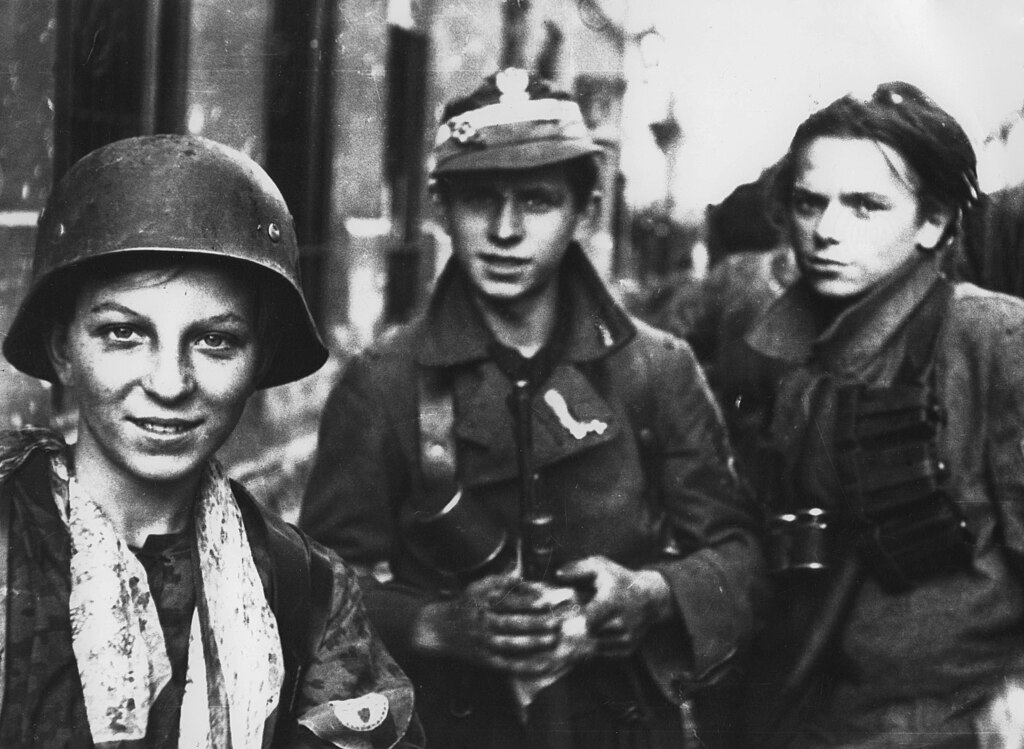The latest in the occasional series by Andy Ford on 80-year anniversaries of events in WW2 in the Soviet Union and Eastern Europe, including articles from Trotskyists from 1944.
[featured photo shows Polish boy scouts fighting in the Warsaw Uprising – wiki commons]
*****
The Warsaw Uprising lasted for 63 days, from 1st August 1944 to the final capitulation of 2nd October. In one of the most heroic episodes of World War 2, the working class of Warsaw battled thousands of Nazi soldiers and the most brutal and depraved SS battalions, armed only with small arms, petrol bombs and whatever heavy weapons and tanks they could capture.
These two articles are from the Trotskyist press of the time. The first one, from the US-published journal ‘Fourth International,’ was written in August 1944, while the struggle still continued but had clearly been left isolated both by the Stalinist bureaucracy and the Anglo-American allies. The second is from the British newspaper, ‘Socialist Appeal’ of October 1944, at which time it was clear that the uprising had gone down to a tragic defeat.
Given a free hand by Stalin’s inaction, the Nazis carried out a horrific revenge for the humiliation of the Uprising’s initial victories, all the more remarkable because they were organised after 5 years of brutal totalitarian occupation, without even a land border to a neutral country to allow for the smuggling of arms and ammunition.
The Nazis unleashed their most deranged anti-partisan formations on the people of Warsaw. They freely engaged in rape, robbery and murder. The behaviour of one of their leaders, Bronislaw Kaminski, who was a Polish collaborator, was so bad that even the Nazis had him executed, although that was mainly because he took his victims’ money and valuables for himself, instead of giving it to the SS.
15,000 Polish resistance fighters died fighting the Nazis on the barricades, in bombed out buildings, and even the sewers, but they had possibly taken out between 2,000 and 17,000 German and their allies. The disparity in numbers is due to differing, and possibly biased, accounts produced by historians during the Cold War between the Stalinist bloc and the “west”.
Most of the civilian population, around half a million people, were expelled from the city, of whom 60,000 were sent to death camps, 90,000 put to forced labour, and the rest dispersed across Poland. Heinrich Himmler decreed that “The city must completely disappear from the surface of the earth…every building must be razed to its foundation” and special squads of engineers went from house to house planting explosive charges. They made special attempts to destroy historical and architectural landmarks, schools and the National Library of Poland. As a result 80% of Warsaw’s buildings were destroyed or seriously damaged by the end of the war.
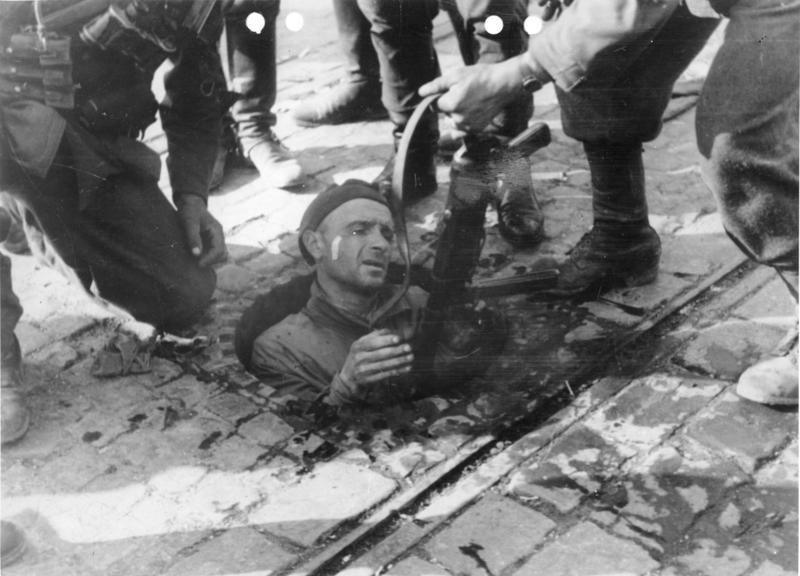
The worst damage, though, was the loss of the very best elements of the working class and youth of Warsaw, who were either killed, captured and mistreated, or dispersed across the country.
Andrzej Wajda’s film Kanal (Sewer), made in 1957 in Stalinist Poland, gives a realistic depiction of the Uprising, almost unbearably so (see here).
******
1) DANGERS AND TASKS FACING THE WORKERS OF POLAND
Editorial, ‘Fourth International’, August 1944
With the Red Army surging across the Western Bug River, the frontier established as the “Curzon Line” [frontier of the USSR drawn by British diplomat, Lord Curzon AF], the Kremlin has proclaimed the formation of a “Polish Committee of National Liberation.” This committee is to serve as the civil authority in the territory being occupied by Soviet troops from this line onward.
The proclamation of the new quasi-government has aroused a flurry of diplomatic activity in Allied circles. The premier of the Polish “government-in-exile” at London flew to Moscow to attempt a conciliation of the two “governments.” After a week of conferences, the negotiations broke down without any results.
The dispute between London and Moscow is, in the main, a dispute over the international alignment of the projected Polish government. London wants to assure its allegiance to the foreign policy of British imperialism. Moscow wants to assure for the Stalinist bureaucracy a friendly capitalist ally on the pattern of the emigre Czechoslovak government of Eduard Beneš.
Moscow’s declaration explicitly states: “The Soviet government declares that it does not pursue aims … of a change of social structure in Poland.” This is the identical language used by Molotov after the entry of the Red Army into Rumania. This statement of policy has been followed by practical measures upholding the domination of the capitalist-landlord oligarchy and suppressing the most elementary rights of the masses. The Polish declaration forebodes the same kind of counter-revolutionary action by the Stalinist agents in Poland.
The manifesto reportedly issued by Stalin’s puppet Polish civil administration further bears this out: “All property confiscated by the Germans will be restored.” Restored, that is, to the capitalist.
The machinations of Stalin and his puppets are a clear warning of the dangers facing the people of Poland.
Under the leadership of the great Warsaw proletariat, the Polish masses have fought for five years with unexcelled heroism against Nazi tyranny. They have not taken up arms to exchange one set of oppressors for another. They have not fought for the predatory interests of British imperialism and its Polish henchmen of the London “government-in-exile.” Nor have they battled in order to submit to the reactionary role of Stalin’s bureaucracy and his Polish puppets.
They have shown in the course of their tenacious resistance to Hitlerism that they mean to be masters of their own destiny. They intend to strike down root and branch the whole landlord-capitalist system which has heaped interminable misery, starvation and death upon them.
Stalin’s treachery at the gates of Warsaw
As the Red Army approached the gates of Warsaw, the embattled workers gave renewed evidence of this irrepressible determination. Despite five years of bloody Nazi repression, they have arisen again with arms in hand to challenge the oppressor. In an unequal battle, with bare hands so to speak, they seized one section of the city after another.
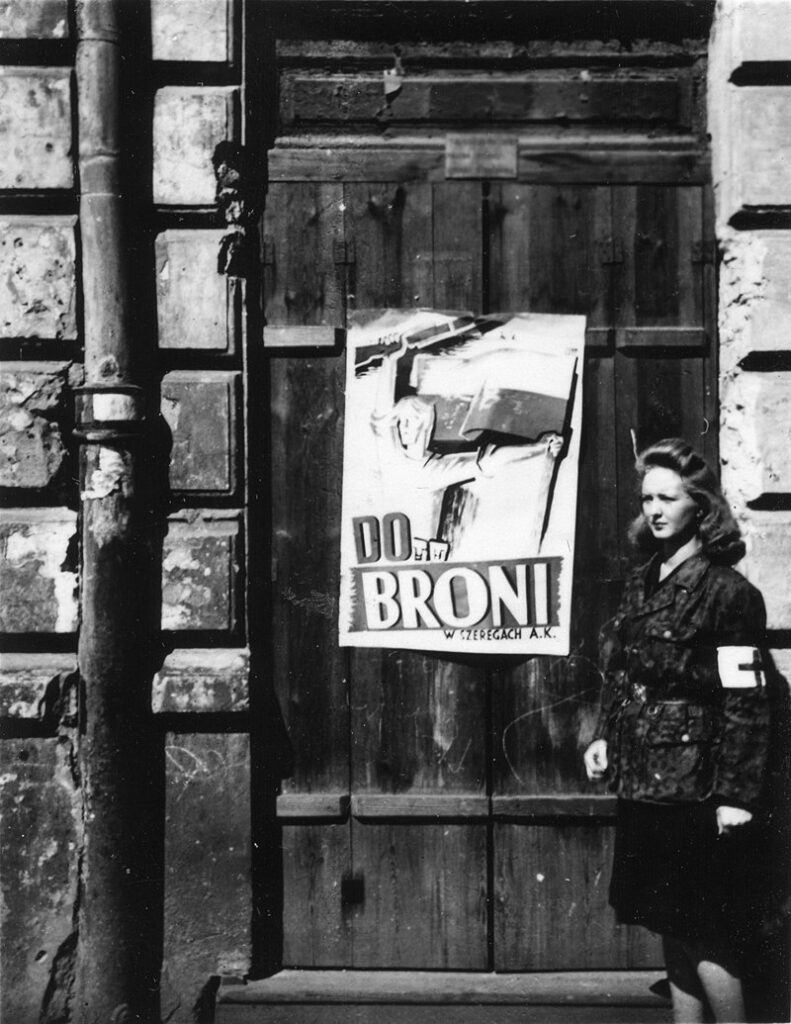
The German forces of occupation were struck with panic and began to evacuate, in the expectation that the assault of the Red Army would be coordinated with the revolt from within. But instead of increasing in intensity, the attack of the Red Army was brought to a standstill. The Nazi military took renewed heart. The heroic workers of Warsaw are being left to battle alone.
By this latest treachery, the Kremlin oligarchy is underlining and emphasizing the counter-revolutionary role it means to play in Poland. Taking a page out of the tactics of Anglo-American imperialism in Italy, the Stalinist bureaucracy leaves the insurgent proletariat to be crushed by the retreating Nazis.
It attempted to cover up this latest betrayal by throwing sand in the eyes of the masses of the world who are eagerly following the struggle. After first denying the very existence of the revolt in the city, and then pooh-poohing it as a mere machination of Polish reactionaries to embarrass the Red Army, it is now issuing statements through the press agency TASS to the effect that the London “government-in-exile” is alone responsible for the isolation of the embattled workers of Warsaw.
That the bourgeois “government” in London, the tool of the Allies, does not really worry over the fate of the Warsaw working class is, to be sure, only too true. That government merely seeks to re-establish the rule of the capitalists, landlords and militarists who previously oppressed the masses and ruined the country. Naturally, they seek to make use of the insurgent movement for their own reactionary end. Like Stalin, they too fear the independent action of the masses, which in the end can only turn against the predatory aims of the London “government-in-exile.” Only treachery could be expected from that quarter.
Reactionary role exposed in action
But the heroic fighters of Warsaw expected a different attitude from the approaching army of the Soviet state. The counter-revolutionary bureaucracy is now revealing in action what advanced workers already knew, namely, that its attitude toward the insurgent workers is no different from that of the imperialists.
At the gates of Warsaw, Stalin is being forced to appear in his whole reactionary nakedness before the entire world. As yet he is attempting to cover himself up with deception. The aforementioned TASS communique states:
“TASS is in possession of information that the London Polish circles responsible for the Warsaw uprising made no attempt to coordinate the revolt with the Soviet high command. The responsibility for the Warsaw happening thus lies entirely with the Polish emigre circles in London.”
He hopes to ward off self-exposure by shouting “Stop, thief” at the Anglo-American imperialists with whom he is allied, and their Polish hirelings. Stalin unquestionably fears the fraternisation between the revolutionary insurgents in Warsaw and the soldiers of the Red Army besieging it. The nightmare of a revolutionary reawakening of the Soviet masses stares in his face across the gates of the embattled city.
By his own actions, Stalin has taught the masses of Poland that they can expect only a stab in the back from the counter-revolutionary gang in the Kremlin. They must now draw the lesson of this betrayal. They must organize their forces to counteract it. They must beware of the scoundrelly Stalinist agents in their midst and drive these vermin from their ranks.
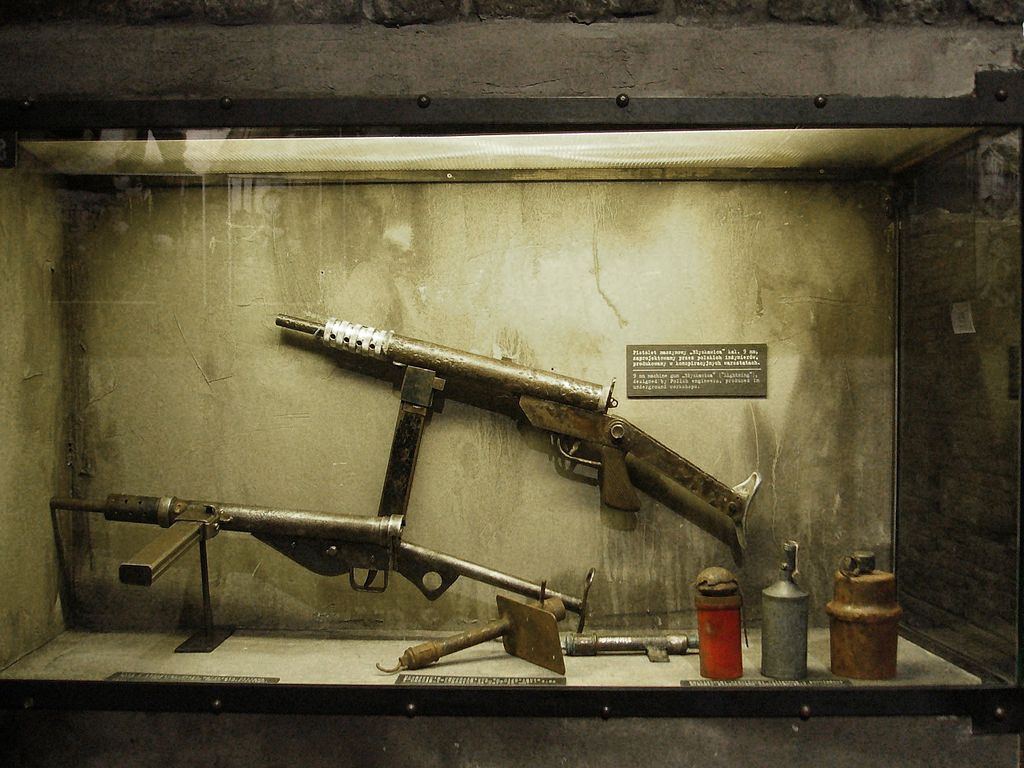
With their own armed forces they must continue their independent revolutionary struggle. They must organize and strengthen their workers’ and peasants’ councils. They must fight to establish a workers and peasants republic on socialist foundations.
Road ahead for polish workers
They must confiscate the factories and operate them under workers control. They cannot place any confidence in the promises of land reforms issued from London or Moscow but must proceed to divide the estates of the robber landlords among the peasants. They will have to take measures to prevent the restoration of the landlord-capitalist regime and its military oligarchy. They must establish full equality for all minorities.
The Polish masses can realize this program only in relentless opposition and vigilant struggle against all the agents of the Anglo-American imperialists and of the counter-revolutionary Stalinist bureaucracy. They will find their most powerful allies in the workers of Germany who are preparing to rise against the shaken Nazi-Junker regime, and in the insurgent workers and peasants of Central Europe.
They must seek to enlist in their common cause the rank and file soldiers of the Red Army, and forge bonds of solidarity with the millions of Soviet workers who remain true to the internationalist ideas and revolutionary traditions of 1917. Through their independent struggle the Polish workers will inspire the Soviet masses to settle accounts with the hated Stalinist bureaucracy.
Arm in arm with these allies the Polish workers must fight to overthrow capitalism and rid Europe of imperialist domination. Their united struggle will assure the revival and extension of the October Revolution and lead to the firm establishment of the Socialist United States of Europe.
*******
2) WHAT HAPPENED IN WARSAW – by Vic Simms
From Socialist Appeal, October 1944
There is a widespread belief [amongst Communist Party members AF] that Stalin could not have played a counter revolutionary role in the Warsaw tragedy. It is regarded not as a struggle for hegemony between the Anglo-Americans and Stain, united no doubt in the destruction social revolution, but simply the irresponsible and criminal devices of the Polish government in London.
For the regular readers of the Socialist Appeal, the general aims of Stalin must be obvious by this time. We have repeatedly analysed the role of Stalin in Germany, France and Spain. Everywhere, in an attempt to get an alliance with a set of imperialists, he played the role of an executioner of revolutions. From this general historical background, his role in Poland can now be clearly understood.
There are three important questions which need an answer with regard to the tragedy of Warsaw. Who was responsible for the uprising? Once it was in progress was any help sent? Finally, in the rival appeals to the Polish masses, is there any programmatic difference?
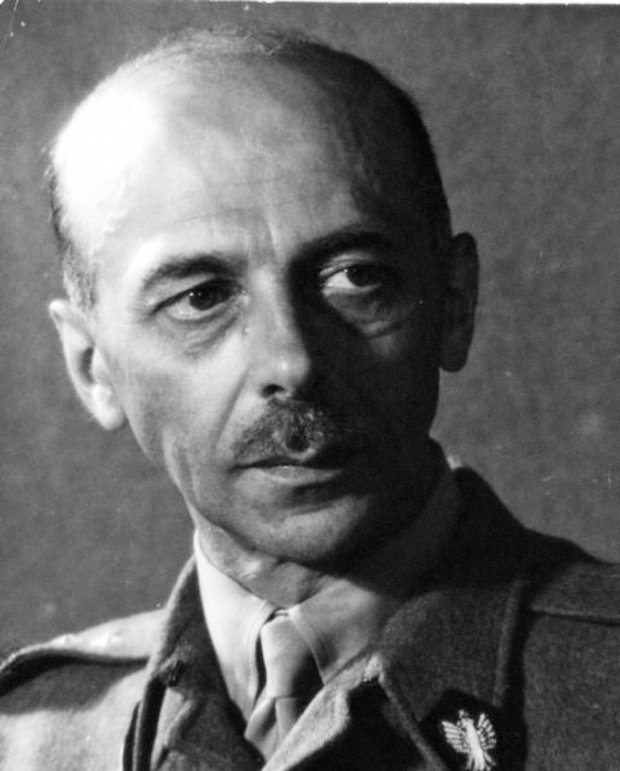
The actual uprising was on the 1st of August. Prior to that, the Red Army was close to Warsaw and the sound of gunfire was audible in the city. General Bor, [General Bor-Komorowski, Polish commander in the Polish underground army AF] representing the London Polish government, gave the order to attack the German garrison inside the city. It was later put forward as an excuse that Moscow had nothing to do with the uprising.
The facts, as revealed in uncontradicted press statements, are that the Moscow radio repeated instructions for an uprising from the 2nd of June until the 31st of July (the day before the uprising). A few random extracts from these broadcasts will prove that Moscow desired the uprising and gave instructions to that effect. On 2nd of June 1944 the Red Army was still not within reach of Warsaw:
“The armed resistance movement has saved tens of thousands from death and inflicted great losses on the Germans. These battles have shown that mass armed resistance is possible and losses are smaller than his submitting passively to terrorism.”
This is in a general broadcast. They do not specify Warsaw. General Bor is still keeping the masses in check. He was opposed to the uprising. The Red Army advance continues. So did the urgency of their tone in broadcasts with direct reference to the restraining orders of Bor on the 5th of June:
“It is generally believed that it is time to act. There’s great discontent with the orders of Bor”
Even then, the words were not directly addressed to Warsaw. No doubt the general instructions could refer to any part of Poland including Warsaw, but no direct reference to the Warsaw uprising. But in the last week of July the Red Army had come close to Warsaw. On the 29th of July, the ‘Moscow Union of Polish Patriots’ issued a direct appeal to Warsaw:
“Appeal to Warsaw. Fight the Germans. No doubt Warsaw already hears the guns of the battle which is soon to bring her liberation… The Red Army will be joined tomorrow by the sons of Warsaw. They will, together with the Allied army pursue the enemy westwards, wipe out the Hitler vermin from the Polish land, and strike a mortal blow at the beast of Prussian imperialism. For Warsaw, which did not yield but fought on, the hour of action has already arrived.”
The instructions of 30th of July are much more clear and specific:
“The whole population should gather round the National Council and the underground army. Attack the Germans. Stop the Germans destroying public buildings. Assist the Red Army crossing the Vistula. Give it information and show it the best fords. The more than a million inhabitants ought to become an army of a million men fighting for liberation and destroying the German invaders.”
From these facts it is now clear that both Moscow and London were equally responsible the orders to Warsaw. It is also clear that no help was sent to Warsaw in the early decisive stage of the struggle from Moscow or London. The dispute that ended in the massacre of the Warsaw workers can be traced through three stages.
First, the uprising on 1st of August and the heroic efforts of the Warsaw masses. Until the third week of August, no help was received. Moscow charged the Polish government in London with responsibility for the uprising and said they could not send help. On 13th of August, Moscow radio broadcast a statement charging the London émigré government with full responsibility for the revolt in Warsaw. To the crucial question why no aid was sent, Moscow radio replied evasively. TASS, the official Soviet news agency in a statement said:
“TASS is in possession of information that the London Polish quarters response for the Warsaw uprising made no attempt to coordinate the results with the Soviet high command. The result for the Warsaw happening thus lies entirely with the Polish émigré quarters in London.”
What then is the meaning of appeals to Warsaw from Moscow on the 29th, 30th and 31st of July?
The second stage of the struggle was reached in the third week of August. By this time, the struggle was petering out. The Anglo-Americans rushed to give token aid to Warsaw. They wanted to fly help to the insurgents. Moscow refused a request for assistance and landing grounds for aircraft. Simultaneously Moscow denounced the insurgents as traitors who will be subject to arrest when the Red Army enters Warsaw.
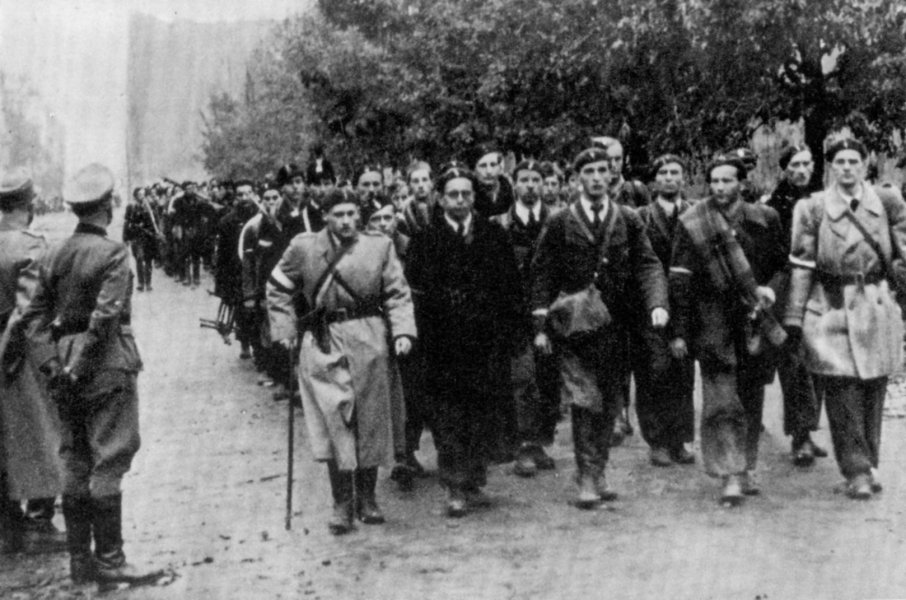
The third stage is reached at the beginning of September. By this time the main struggle in Warsaw has been crushed by the most brutal methods by the German armies. The advance of the Red Army resumed and by then was in the Praga district [suburb of Warsaw on the opposite side of the River Vistula AF].
Why was this betrayal of the Warsaw workers perpetrated? The Anglo-American-dominated London émigré government and the allies sent no assistance. They knew the date of the uprising in advance. But either no preparations were made, or they were held back for some reason. Similarly, Moscow asked for an uprising and denied help.
The real explanation can only be sought in the actual character of the struggle inside Warsaw and the fundamentals on which Stalin, Roosevelt and Churchill are agreed, and the points on which they disagree. Let us look at the fundamental agreements.
Stalin, Roosevelt and Churchill are agreed that there should be no successful social revolutions in Europe. The Stalinist programme in Italy, in France, and in Eastern Europe clearly illustrates this. Repeatedly they have said they not only stand for a post-war capitalist Europe, but also for status quo with regard to the colonial empire of France. This was the main agreement recent Tehran.
Concretely, when this is carried into Poland, both the Moscow committee and London émigré government put forth essentially the same programme. The Moscow committee may couch its programme in radical phrases, but the content is identical. Both stand for a democratic capitalist Poland with a limited measure of agrarian reform.
If there is such an agreement on the fundamentals, why is there a conflict over Poland? Why are there two public governments, one in Moscow and one in London? The Anglo-Americans have conceded the Curzon Line as a frontier. It shows that underneath the superficial agreement, Stalin and the Anglo Americans are sceptical of each other’s good faith. The game is given away in an editorial in The Times on 31st of August 1944:
“Both Great Britain and the United states have shown themselves traditionally sensitive to the direct intervention of any power in certain regions which they have properly regarded as vital to their security”
In the light of these cross currents the tragedy of Warsaw can be explained. Whoever attempted to control the uprising, the proletariat of Warsaw put its stamp on the revolt from the very start. It was not merely a military operation but a mass uprising the people of Warsaw. Both the reports of the Manchester Guardian and the News Chronicle confirmed that there is an element of spontaneity.
From the start, the fighting was conducted on the barricades with Molotov cocktails. General Bor might have technically been in charge but the street committees were the main instruments of struggle. The conclusion that flows from such analysis is that because of its revolutionary potential, Warsaw was doomed to receive no assistance either from the Anglo-Americans or Stalin.
It is necessary to get the full implications of the Warsaw massacre. It is both a lesson and a warning to the masses of Europe. More than ever before, they must recognise the character of ‘liberation’ by Stalin and the Anglo Americans. Relying on their own strength, and the strength of the ad hoc organisations they will forge in the course of the struggle, they must appeal to the rank and file of the Red Army and the workers of Britain and America. Only such an independent course can lead to their emancipation.

